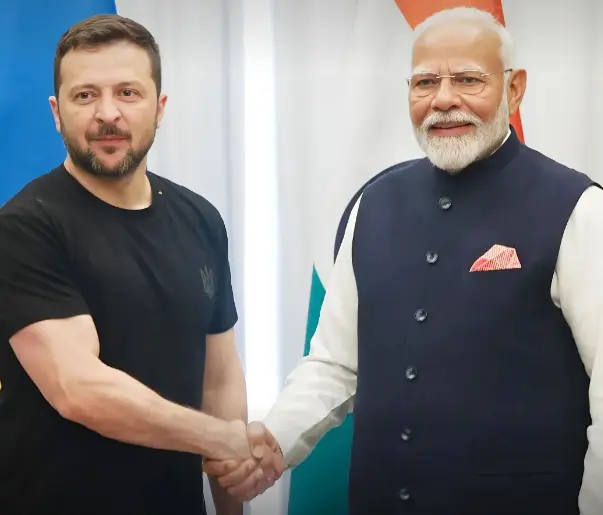Here’s a brief round-up of the global media’s coverage of Prime Minister Narendra Modi’s visit to Ukraine and his meeting with President Volodymyr Zelensky.

Before you read here’s the summary:
1. Historic Visit: Prime Minister Narendra Modi’s visit to Ukraine marks the first time an Indian leader has visited the country since its independence in 1991. His trip was praised internationally as a significant diplomatic milestone.
2. Cautious Diplomacy: While in Kyiv, Modi, the 72nd world leader to visit since Russia’s invasion, emphasized dialogue and diplomacy over conflict, reflecting India’s careful approach to not strain its relationship with Russia.
3. Zelensky’s Remarks: Ukrainian President Volodymyr Zelensky highlighted India’s influence on Russia’s economy, suggesting that a shift in India’s stance on its oil imports could pressure Putin to end the war.
4. Tense Relations: Zelensky accused Putin of disrespecting Modi, citing a Russian bombing in Ukraine that coincided with Modi’s presence in Moscow, as evidence of Russia’s disregard for India’s diplomatic efforts.
5. Focus on the Future: Zelensky expressed dissatisfaction with India’s stance at the United Nations but emphasized the need to move forward, focusing on building positive relations rather than dwelling on past disagreements.
New Delhi: Prime Minister Narendra Modi’s historic visit to Ukraine and his meeting with President Volodymyr Zelensky has been widely praised by international media as a significant diplomatic milestone. PM Modi is the first Indian leader to set foot in Ukraine since it gained independence in 1991, marking a momentous chapter in India’s global outreach.
India’s Prime Minister is the 72nd world leader to visit Kyiv since Russia’s invasion, but the talks between the two leaders seemed somewhat disconnected. India, careful not to strain its relationship with Russia, avoided directly mentioning the conflict in their joint statement, instead calling for a “peaceful resolution through dialogue and diplomacy.”
Prime Minister Narendra Modi made a significant journey to Ukraine’s capital, arriving early on National Flag Day after a 10-hour train ride from Poland. His visit, lasting just nine hours, marked the first time an Indian Prime Minister has set foot in Ukraine since its independence in 1991. Despite this historic moment, Modi became the 72nd global leader to visit the embattled nation since Russia’s invasion in February 2022.
In a symbolic meeting with Ukrainian President Volodymyr Zelenskyy, Modi reflected on a pivotal moment during his prior discussions with Russian President Vladimir Putin, where he boldly stated, “This is not an era for war.” He reiterated his belief that “solutions cannot be found on the battlefield” but must be achieved through dialogue and diplomacy—principles that have defined India’s diplomatic stance throughout the ongoing conflict.
These powerful declarations, which Modi has repeatedly emphasized on the global stage, underscore the entirety of India’s approach to the war. Yet, during this critical meeting, it became clear that the Prime Minister had no new proposals beyond these well-known positions.
Seated beside Zelenskyy at the presidential palace, Modi called for immediate action, urging that “without wasting time, both sides should sit down towards this direction and find a way out of this crisis.” His words echoed with urgency, encapsulating India’s commitment to peace and the pursuit of a diplomatic resolution in the face of a relentless conflict.
Ukrainian President Volodymyr Zelensky, on Friday, highlighted India as a “big country” with significant “influence” on Russia’s economy, suggesting that if India and its people “change their attitude” towards Russia, the ongoing war could come to an end because Russian President Vladimir Putin would be compelled to stop it. Zelensky was referring to India’s “record-breaking” oil deals with Russia.
During the talks between Prime Minister Narendra Modi and President Zelensky, India’s energy purchases from Russia were a key topic. External Affairs Minister S. Jaishankar explained that the Indian side outlined the current energy market situation and emphasized the importance of keeping prices “reasonable and stable.”
In an hour-long interaction with the visiting Indian media, Zelensky described his meeting with Modi as “very good” and “historic.” He pointed out that one of the main issues discussed was India’s ongoing oil purchases from Russia.
“Because today many possibilities of Russian exports are closed, your country is open,” he said. “If you stop import of oil, Putin will have huge challenges.”
He said that Mr. Putin has a war economy and billions coming from India or China helped him. “We should stop giving money in strengthening Russian arms,” he stressed.
He claimed that President Putin has “never truly respected” Prime Minister Modi, pointing to the chilling fact that Russia bombed a hospital in Ukraine at the very moment the Indian leader was in Moscow last month. This stark act, he suggested, was a clear sign of Russia’s disregard for Modi’s presence and diplomatic efforts.
Asked if the issue of India’s stance on resolutions at the United Nations was discussed, he said it was not. “We are not happy that we didn’t get Indian support. We have to now speak before the resolutions. We don’t have time to looks at the past. I want to build something good, something positive,” he said.
Tap here to read: India and U.S. Forge Strategic Ties with Two Major Defense Deals During Rajnath Singh’s Washington Visit.